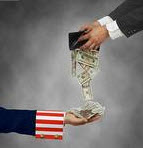Here is an article from Tax-News that covers the impending tax rate hikes faced by all tax payers but felt most by those on dividend income. Also, I have included at the bottom of the article the 2012 exclusions for income earned outside the US. We benefit from this here in Panama where the tax rates are lower and we are exempted in the US from $95,100 in net earned income this year. Also, interest income from time deposits are exempt from Panama taxes as well. So if you can earn 4 to 5 % in a 5 year CD, your effective return is greater here in comparison to alternative investments in the US in some cases. By the way, I am often asked about investing in credit unions here in Panama. Do not bother asking any more questions on this subject as I keep repeating the same answer, if it is too good to be true….
by Mike Godfrey, Tax-News.com, Washington
17 July 2012
According to a study prepared for the Edison Electric Institute (EEI) by Ernst & Young, the sharp increase in United States dividend tax rates, which will take effect on January 1 next year unless Congress takes action, would hurt older American investors who are at or nearing retirement age the most.
The release of the study comes amidst much political discussion over the fate of the Bush income tax cuts, which also include lower capital gains and dividend taxes. The study points out that tens of millions of Americans rely directly and indirectly on dividends.
“Dividend income benefits millions of Americans who are not wealthy, including many seniors and those investing for the future of their families,” said Lew Hay, chairman of EEI. “Raising taxes on dividends would harm every American who owns dividend-paying stocks, as well as anyone who has an interest in a mutual fund, 401(k) retirement savings account, pension plan, or life insurance policy that invests in those stocks.”
The current 15% tax rate on dividends will expire on December 31 this year, unless US lawmakers intervene. If no action is taken, dividend tax rates for all income levels will increase, with the maximum tax rate spiking to 43.4% – a 189% increase.
The study analyzes Internal Revenue Service tax returns filed in 2009, the most recent year for which complete data are available, in order to provide a profile of dividend recipients. Of the 25.4m tax returns with qualified dividends, 63% were filed by those aged 50 and older.
It is considered that, with current low interest rates, interest-bearing investments have failed to keep up with the pace of inflation, and, in increasing numbers, older investors are turning to dividend investments that produce supplemental income. It is said that, for those living on fixed incomes and counting on dividends to help pay their bills, a reduction in their dividend payments could be devastating.
“This study illustrates the concentration of seniors and middle-income taxpayers relying on dividends,” said Jim McCrery, manager of the Alliance for Savings and Investment, a coalition of companies, trade associations and investor organizations. “If the top tax rate is nearly tripled – even if limited to upper-income taxpayers – it is likely that companies would reduce their dividend payouts, which would hurt direct and indirect investors at every income level.”
2012 tax regs
.26 Expatriation to Avoid Tax. For calendar year 2012, an individual with “average
annual net income tax” of more than $151,000 for the five taxable years ending before
the date of the loss of United States citizenship under § 877(a)(2)(A) is a covered
expatriate for purposes of § 877A(g)(1).
.27 Tax Responsibilities of Expatriation. For taxable years beginning in 2012, the
amount that would be includible in the gross income of a covered expatriate by reason
of § 877A(a)(1) is reduced (but not below zero) by $651,000.
.28 Foreign Earned Income Exclusion.
The amount of foreign wages and salary you can exclude per year is limited to your actual foreign wages or the annual maximum dollar limit, whichever is less. Starting with tax year 2006, the foreign earned income exclusion is adjusted each year for inflation by the Internal Revenue Service.
For taxable years beginning in 2012, the foreign earned income exclusion amount under § 911(b)(2)(D)(i) is $95,100.
